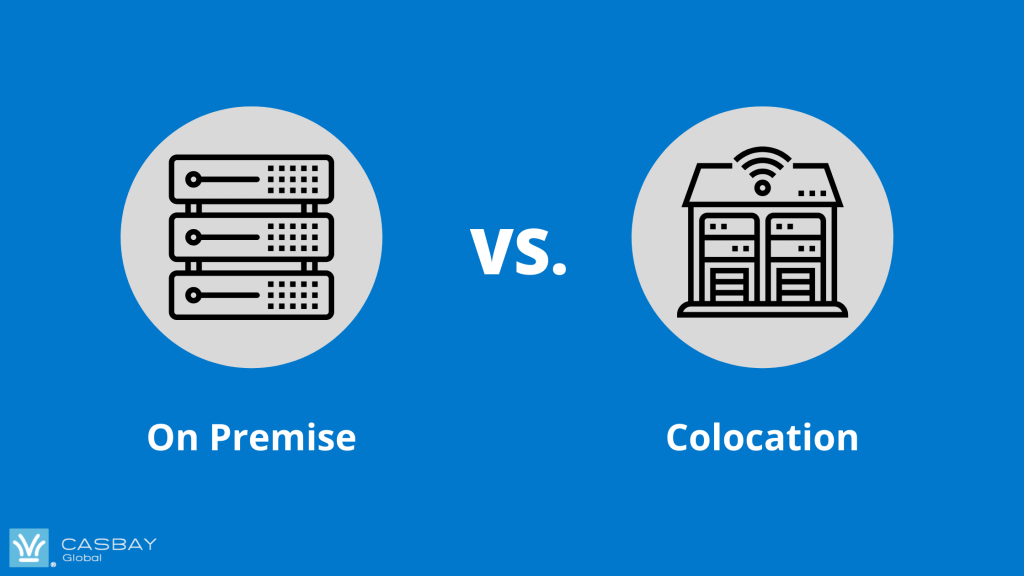If your organizations is planning to expand the IT infrastructure, you must first decide where to keep your servers, whether on-premises, colocate at a data center, or shift them to cloud. The decision can have significant long-term implications to a company, as deciding to continue with an on-premises solution will be a huge commitment to future capital and operating expenses. In this article, we will discuss the pros and cons of both on-premise storage and colocation service.
On-Premises Data Center
On-premise storage, also known as in-house servers, are housed in a dedicated facility. These servers are located in a small room, or “server closet”. With on-premise, your team has complete control over the resources. Everything is procured, owned, and managed by your team.
Advantages
- Full control, modify, expand, and consolidate to fit your need
- Enables your team to easily access it at anytime
- Implementation of tailored measures for security and uptime
- Complete data access control ideal for organizations with regulatory requirements
Disadvantages
- Upfront payment necessary for additions and modifications, plus the time required to install, and physical space limit which can cap growth
- Weighty responsibilities to manage and maintain all aspects of infrastructure fall to the in-house staff
- Operational costs can be higher than for colocations
- Redundancy can be more challenging. Small and mid-sized organizations and institutions may struggle to afford divergent internet connections and robust emergency backup facilities
- Single point of failure
Colocation Data Center
For those looking to expand or upgrading their infrastructure, renting server space and hardware might be a better option. This can be done thanks to colocation services.
Instead of an on-premise storage, colocation enables businesses to rent space to colocate your server and other computing hardware via a third-party facility. These facilities also typically have redundant power and internet systems to boost your maximum uptime.
Advantages
- Cost saving as cooling and power are spread across multiple customers in shared colocation data center.
- No worry about redundancy and power connections as they are offered by the provider to maximize uptime.
- Colocation providers may offer mirrored data centers for disaster recovery purposes, so a local outage or disaster will have minimal impact on operations.
- Some colocation providers even provide high-end physical security features.
Disadvantages
- Initial set-up fees and licensing costs can affect budget.
- Colocation transition process can be risky and expensive.
- Physical access and maintenance downtimes may not be able to be scheduled depending on the colocation provider.
- Bandwidth between the company/organization and its equipment can decline and latency problems can arise.
Things To Look Out When Choosing A Colocation Service
Below are 4 main important points for you to make a better decision. Understand them before you start to colocate your server to the data center of your provider.
1. Location
A data center that is near to you is very important as you should be ready to go to the data center when a problem arises. This is because you are responsible for the maintenance and installation of your server. Remember to look at the network connectivity as well.
2. Transparency
Next, you should go for a company that practices transparency and provides you with self-monitoring and management of your server without any hidden charges. You should understand the provider’s terms and conditions before choosing them.
3. Flexibility
To expand and grow your business, you need power, space, cooling system and internet connectivity. It’s important for the provider to have contiguous space to shorten network run between cabinets, as well as a cooling system to cool down your infrastructure. Good internet connectivity is also a must for high-speed when operating your server.
4. Security
You don’t want to lose any important data in a natural disaster. Pick a data center that will protect you from these issues by providing a backup system. The latest security technology should also be installed by the data center to make sure your data resources are in a safe place.
If you are still not sure about server colocation, do not hesitate to contact our support team for more information and to look for the best solution for your business.




